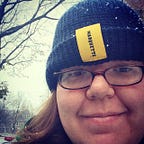“Call Me Crazy,” But We Love Anna Miller’s “Crazy” Podcast
Perhaps you were not aware, but the Digital Scholarship Lab works hard to build partnerships with professors and classes. And as digital media becomes more and more prevalent in education, our role on campus and in the classroom is expanding. Elizabeth Gibes, librarian and director of the DSL, was embedded in Dr. Theresa Tobin’s Spring 2017 Feminist Philosophy class this past semester, and helped the students to create a magazine of essays on Medium, each exploring an intersection between gender and philosophy and society.
Anna Miller’s project took a unique format — instead of writing an article, Anna wrote out and recorded a podcast for the assignment.
In the podcast, Anna traces the rhetoric of the word “crazy” as it’s been applied to women across modern culture and history. She focuses especially on the point where two definitions of the word interact in a way that minimizes and oppresses the agency and voice of women. Calling upon feminist philosophers and academics such as Sandra Bartky, Claudia Card, Elaine Showalter, and more, Anna exposes how “crazy” as “mental illness” and “crazy” as “female sexuality” are employed by the patriarchy to undermine women’s self-worth, contributions, and existence. Calling women crazy, Anna says, “shapes how we think, how we interact with the world, how we interact with our bodies,” and ultimately, how we perceive our ability to react to sexism and oppression in our society.
So, why a podcast? Why not just a regular essay on the topic?
Anna says that she chose a podcast for a couple of reasons, and not just because she loves them herself. The appeal, she tells us, are the possibilities for presenting information in a different way than you would in a regular term paper. A podcast is less an argument, and more the telling of a story, and it uses a different style of language and rhetoric than an academic paper would. Not to mention it gave her the chance to feature not just examples but clips from the songs and television shows she was referencing as she explained her point.
It’s exciting to think about, the way digital media opens the door to thinking about the presentation of information in new and interactive ways. Sitting and listening to Anna’s podcast tonight, I was able to engage with the information in a much different way than if I’d been reading a paper on the topic. And it was certainly quite enjoyable.
If you’d like to learn more about podcasting or the tools the DSL offers for creating, recording, and publishing podcasts, please stop by and introduce yourself. Our group of librarians, staff, and student tutors will be happy to help!
